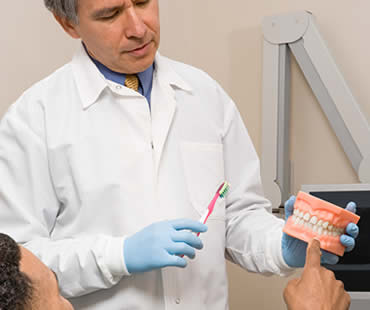
by Dr. Adkins | Sep 24, 2021 | Blog, Dental Topics 1, Family Dentist
If you haven’t been to the dentist in a while, you may not recall the process for a regular checkup. These visits are an important part of your oral health care. If you are in good dental health, your dentist will probably suggest twice-yearly visits. Individuals with gum disease or other oral health concerns may need to schedule more frequent appointments. Feel free to ask your dentist questions or raise concerns at the visit.
Your dental checkup will usually include:
• Full Health History
Because oral health affects your overall wellness, your dentist will want to have a complete picture of your whole situation. A member of the dental team will ask you questions and gather relevant details about your present status. Make sure to provide helpful information like current medications and any pressing issues.
• X-Rays
Typically, your dentist will take X-rays about once a year. These images provide a clear view of your teeth and gums. Often, X-rays will identify problems, like impacted teeth, cysts, abscesses, or decay between teeth that might otherwise go undiagnosed.
• Complete Evaluation
During your checkup, the dentist will perform a periodontal assessment, bite analysis, and tooth-by-tooth inspection. If the dentist discovers a problem, your provider will make treatment recommendations to address the issue and restore your oral health.
• Thorough Cleaning
If everything checks out, the hygienist will typically remove plaque and tartar build-up from your teeth. At this time, the hygienist may also polish and floss teeth to refresh your smile.
Our dental office is located in McDonough

by Dr. Adkins | Sep 17, 2021 | Blog, Cosmetic Dentistry, Dental Topics 1
Age, bad habits, and food and drink choices can all add up to be hard on our teeth. If you are unhappy with your smile and wish you could improve it, consider cosmetic dental procedures. Cosmetic dentistry offers a variety of options for restoring your smile.
Teeth whitening
One of the most popular cosmetic dental procedures, teeth whitening can either be performed at your dentist’s office or at home. Methods used by your dentist work quickly and can provide dramatic results, but many patients are very pleased with home methods as well. Home treatments may be as simple as using products you purchase at your drugstore, or your dentist can provide customized bleaching trays for home use.
Bonding
Tooth-colored resin can be applied to your teeth to correct chipped, broken, stained, or decayed teeth in a single dental visit. The resin is molded onto the surface of your damaged tooth, shaped, and then polished to match your other teeth.
Veneers
If you’re looking for a long-lasting and stain resistant solution to damaged teeth, porcelain veneers are a good choice. These thin custom shells are adhered to your teeth to cover them so that they provide a beautiful smile.
Composite fillings
A material called composite resin is used to restore decayed teeth or to reshape your teeth to improve their appearance. Composite fillings can correct minor imperfections like a chipped tooth, or it can restore a whole tooth like a molar to a fully functional tooth.
Inlays and onlays
For large cavities or cracks in your back teeth, inlays and onlays may be used instead of fillings. These tooth-colored restorations are created in a laboratory, and then adhered to your teeth so they fit perfectly.
Cosmetic dentist in McDonough

by Dr. Adkins | Sep 3, 2021 | Blog, Cosmetic Dentistry, Dental Topics 1
Do you have gapped or crooked teeth? Have you wondered if braces are the right choice to correct your alignment issues? Slight imperfections that haven’t bothered you as you grew up might now seem like glaring issues to you. If the thought of wearing braces or some other kind of orthodontia for years is something you’re dreading, you should talk to your dentist; dental veneers may be exactly what you need to correct your smile concerns.
Dental veneers are very thin wafers of porcelain, composite resin or some other tooth-colored material that are permanently bonded to the surface of your natural tooth. Dental veneers are incapable of correcting alignment (or “bite”) issues, but they can create an illusion of perfectly straight, white teeth. Veneers don’t require any of the metal hardware you might imagine with braces, and they take only one or two office visits to complete. Veneers are very durable and long-lasting, and with proper care can last up to twenty years before they need replacing.
If you have good general health, you are a candidate for dental veneers. Because veneers rely on the strength of the natural tooth to bond, a tooth that is decayed or infected cannot have a veneer. Dental problems such as fillings or other issues must be corrected before a veneer can be placed. Patients who possess healthy mouths with teeth that are simply crooked, gapped, discolored or chipped should look to dental veneers to correct their problems.
If you are unhappy with your smile, talk to cosmetic dentist Dr. Adkins in Vancouver today. Dental veneers could be the perfect solution for you. There’s no reason to wait for the results of braces when dental veneers can give you the smile you want now.
If you need a dentist in McDonough contact us today

by Dr. Adkins | Aug 13, 2021 | Blog, Cosmetic Dentistry, Dental Topics 1
If you are unhappy with your smile, porcelain veneers are a cosmetic dentistry option that can provide you with flawless teeth. Veneers are a very popular way to improve your appearance without a major, invasive procedure. Here are some things you should know about porcelain veneers if you are considering them as a solution for an imperfect smile.
Difference between veneers and crowns
The purpose of veneers is to restore your smile, and your original teeth are not removed or altered. However, a large part of the original tooth structure is removed with crowns in the process of building a new tooth. If you’re seeking a minimally invasive option, veneers may be your answer.
Natural appearance
Veneers are customized just for you, so your smile can be personalized to meet your desires. Your teeth will look natural and healthy. Porcelain is translucent and provides a realistic look to your smile. Also, stains do not stick to porcelain and even if there is any small staining, it can be easily polished off during a dental cleaning.
Permanent solution
Veneers are a permanent tooth restoration, so make sure you are happy with the color and shape before they are placed using dental cement. Alterations cannot be made once the veneers are in place.
Requires healthy teeth
A thorough examination by your dentist is required to determine if veneers are right for you. Some oral conditions do not work well with veneers, so your dentist will make sure your teeth and mouth are healthy enough to work successfully with veneers.
Cosmetic Dentist in McDonough

by Dr. Adkins | Aug 6, 2021 | Blog, Dental Topics 1, Family Dentist
You may know all about basic dental care. Most people can tell you about the importance of brushing twice a day and flossing regularly. If you asked friends and family, they could probably list the virtues of eating whole grains, lean meats, and green vegetables to keep teeth and gums healthy. The majority of individuals, though, probably don’t know these fun facts:
- Approximately 33 percent of people squeeze their toothpaste from the middle.
- As early as 700 BC, people carved false teeth out of animal bones.
- During ancient times, the barber cut your hair, gave you a shave, and extracted injured teeth.
- Each year, Americans fork out more money on hair care and lottery tickets than they do on their dental health.
- In 1994, a West Virginia inmate scaled a wall and escaped prison using a rope made from dental floss.
- Modern toothpaste was first manufacture by the Colgate Company.
- People brushed their teeth with twigs or their fingers before toothbrushes were invented.
- Poor individuals sold their teeth to the wealthy during the 18th century and these people used them as replacement teeth.
- Surprisingly, cows don’t have upper teeth.
- The Mexican version of the Tooth Fairy, called the Tooth Mouse, takes the lost tooth and leaves behind a small gift.
- To win the 1986 National Spelling Bee, the top contestant correctly spelled odontalgia, another word for toothache.
- When asked, 73 percent of Americans said they would rather grocery shop than floss their teeth.
We treat patients from McDonough and the surrounding area

by Dr. Adkins | Jul 30, 2021 | Blog, Dental Topics 1, Implant Dentistry
As with any surgery, there are benefits and risks that come with getting dental implants. This procedure to replace missing teeth is becoming increasingly popular, so here are some things to know if you are considering this type of treatment.
What are the benefits?
- Appearance – implants blend in with your smile and look very natural.
- Comfort – they function and feel like natural teeth.
- Support – implants support your jaw and avoid a “caved in” look to your face, preserving your youthful appearance.
- Sensitivity – many patients have less tooth and gum sensitivity after getting implants.
- Adjacent teeth – neighboring teeth are not affected.
- Durability – implants are usually there for life, not needing surgical replacement. Even if the artificial tooth needs replacing, it can be done without surgery.
- Speech – dental implants allow you to speak clearly, as you would with your real teeth.
- TMJ – replacing missing teeth helps prevent jaw disorders
- Bone loss – titanium posts implanted into your jaw can help prevent bone loss and gum recession.
What are the risks?
- Infection – gums and tissue may become infected without proper oral hygiene. It’s important to follow all recovery and maintenance instructions carefully.
- Failed integration – sometimes implants do not integrate properly with the bone. If the implants do not fuse, they can be uncomfortable or loose. When this happens, implants must be removed and can be redone after the area has healed.
- Sinus problems – your sinuses can be affected when implants are placed in the very back of your jaw, sometimes requiring sinus augmentation surgery.
- Nerve or tissue damage – rarely, implants damage nerves or blood vessels. This can cause pain, tingling, swelling, or numbness. This typically is not a risk when a qualified dentist or oral surgeon performs your implant procedure.
Dental implants dentist in McDonough








 (470) 665-5292
(470) 665-5292  E-Mail Us
E-Mail Us 
